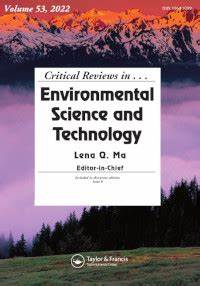高级氧化过程中的纳米约束
IF 11.4
1区 环境科学与生态学
Q1 ENVIRONMENTAL SCIENCES
Critical Reviews in Environmental Science and Technology
Pub Date : 2022-11-25
DOI:10.1080/10643389.2022.2146981
引用次数: 13
摘要
基于活性自由基生成的高级氧化工艺(AOPs)被广泛认为是难降解有机污染物矿化或生物难降解化合物预处理的有效技术。由于超短寿命自由基的快速自猝灭、传质和非选择性的限制,AOPs的效率受到其低可用性的影响。由于聚合、泄漏和中毒等原因,催化剂的活性和稳定性下降,阻碍了多相AOPs的发展。在有限的纳米空间中进行氧化反应,可以大大提高高活性组分的有效性、选择性和反应活性。将纳米颗粒催化剂限制在多孔支架或基质中,可以提高其稳定性、可及性、多样性和活性。其他约束系统,如表面约束、量子约束和电子约束,也被应用于不同的AOPs中,以提高污染物的降解性能。本文系统综述了上述纳米约束在aop中的应用。展望和挑战提出了激发未来的兴趣和突破纳米限制在AOPs。图形抽象本文章由计算机程序翻译,如有差异,请以英文原文为准。
Nanoconfinement in advanced oxidation processes
Abstract Advanced oxidation processes (AOPs) based on the generation of reactive radicals are widely accepted to be effective technologies for mineralizing refractory organic contaminants or pretreating bio-recalcitrant compounds. The efficiencies of AOPs suffer from the low availability of ultrashort lifetime radicals due to their rapid self-quenching, mass transfer and nonselective limitations. Heterogeneous AOPs are hampered due to the declining activity and stability of catalysts resulting from aggregation, leakage and poisoning. The effectiveness, selectivity and reactivity of highly reactive species of AOPs can be greatly enhanced when the oxidation reactions are conducted in confined nanospaces. The stability, accessibility, variety and activity of nanoconfined catalysts would be improved by confining the nanoparticle catalysts inside porous scaffolds or substrates. Other confined systems, such as surface confinement, quantum confinement and electron confinement, have also been applied in different AOPs to improve the contaminant degradation performance. The above-mentioned nanoconfinement applications in AOPs are systematically summarized in this critical review. Prospects and challenges are presented to stimulate future interest and breakthroughs for nanoconfinement in AOPs. GRAPHICAL ABSTRACT
求助全文
通过发布文献求助,成功后即可免费获取论文全文。
去求助
来源期刊
CiteScore
27.30
自引率
1.60%
发文量
64
审稿时长
2 months
期刊介绍:
Two of the most pressing global challenges of our era involve understanding and addressing the multitude of environmental problems we face. In order to tackle them effectively, it is essential to devise logical strategies and methods for their control. Critical Reviews in Environmental Science and Technology serves as a valuable international platform for the comprehensive assessment of current knowledge across a wide range of environmental science topics.
Environmental science is a field that encompasses the intricate and fluid interactions between various scientific disciplines. These include earth and agricultural sciences, chemistry, biology, medicine, and engineering. Furthermore, new disciplines such as environmental toxicology and risk assessment have emerged in response to the increasing complexity of environmental challenges.
The purpose of Critical Reviews in Environmental Science and Technology is to provide a space for critical analysis and evaluation of existing knowledge in environmental science. By doing so, it encourages the advancement of our understanding and the development of effective solutions. This journal plays a crucial role in fostering international cooperation and collaboration in addressing the pressing environmental issues of our time.

 求助内容:
求助内容: 应助结果提醒方式:
应助结果提醒方式:


